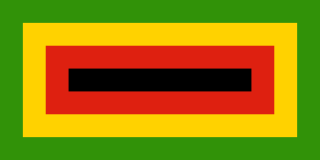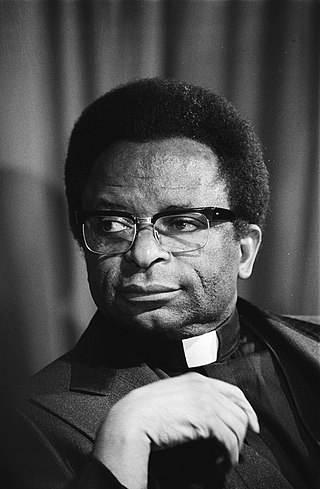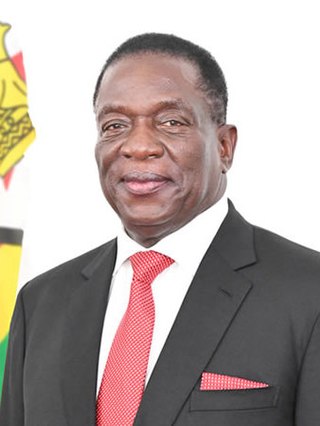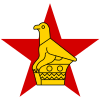
The politics of Zimbabwe occurs in a society deeply divided along lines of race, ethnicity, gender and geography. The ZANU–PF party has historically been dominant in Zimbabwe politics. The party, which was led by Robert Mugabe from 1980 to 2017, has used the powers of the state to intimidate, imprison and otherwise hobble political opposition in Zimbabwe, as well as use state funds and state media to advance the interests of the party.

The Gukurahundi was a series of mass killings in Zimbabwe which were committed from 1983 until the Unity Accord in 1987. The name derives from a Shona-language term which loosely translates to "the early rain which washes away the chaff before the spring rains".

The Zimbabwe African National Union – Patriotic Front (ZANU–PF) is a political organisation which has been the ruling party of Zimbabwe since independence in 1980. The party was led for many years by Robert Mugabe, first as prime minister with the Zimbabwe African National Union (ZANU) and then as president from 1987 after the merger with the Zimbabwe African People's Union (ZAPU) and retaining the name ZANU–PF, until 2017, when he was removed as leader.

Joshua Mqabuko Nyongolo Nkomo was a Zimbabwean revolutionary and politician who served as Vice-President of Zimbabwe from 1990 until his death in 1999. He founded and led the Zimbabwe African People's Union (ZAPU) from 1961 until it merged in 1987 with Robert Mugabe's Zimbabwe African National Union (ZANU) to form ZANU–PF after an internal military crackdown called Gukurahundi in western Zimbabwe, mostly on ethnic Ndebele ZAPU supporters.

The Zimbabwe African People's Union (ZAPU) is a Zimbabwean political party. It is a militant communist organization and political party that campaigned for majority rule in Rhodesia, from its founding in 1961 until 1980. In 1987, it merged with the Zimbabwe African National Union-Patriotic Front.

Abel Tendekayi Muzorewa, also commonly referred to as Bishop Muzorewa, was a Zimbabwean bishop and politician who served as the first and only Prime Minister of Zimbabwe Rhodesia from the Internal Settlement to the Lancaster House Agreement in 1979. A United Methodist Church bishop and nationalist leader, he held office for only a few months.

The Internal Settlement was an agreement which was signed on 3 March 1978 between Prime Minister of Rhodesia Ian Smith and the moderate African nationalist leaders comprising Bishop Abel Muzorewa, Ndabaningi Sithole and Senator Chief Jeremiah Chirau. After almost 15 years of the Rhodesian Bush War, and under pressure from the sanctions placed on Rhodesia by the international community, and political pressure from South Africa, the United Kingdom, and the United States, the Rhodesian government met with some of the internally based moderate African nationalist leaders in order to reach an agreement on the political future for the country.
James Robert Dambaza Chikerema served as the President of the Front for the Liberation of Zimbabwe. He changed his views on militant struggle in the late 1970s and supported the 'internal settlement', serving in the attempted power-sharing governments.

Emmerson Dambudzo Mnangagwa is a Zimbabwean politician who is serving as President of Zimbabwe since 24 November 2017. A member of ZANU–PF and a longtime ally of former President Robert Mugabe, he held a series of cabinet portfolios and was Mugabe's Vice-President until November 2017, when he was dismissed before coming to power in a coup d'état. He secured his first full term as president in the disputed 2018 general election. Mnangagwa was re-elected in the August 2023 general election with 52.6% of the vote.

General elections were held in Southern Rhodesia between 14 February and 4 March 1980 to elect the members of the House of Assembly of the first Parliament of the independent Zimbabwe. As stipulated by the new Constitution of Zimbabwe produced by the Lancaster House Conference, the new House of Assembly was to comprise 100 members, 80 of whom would be elected proportionally by province by all adult citizens on a common roll, and 20 of whom would be elected in single-member constituencies by whites on a separate roll.

Joseph Wilfred Msika, was a Zimbabwean politician who served as Second Vice-President of Zimbabwe from 1999 to 2009.
The Southern Rhodesia African National Congress (SRANC) was a political party active between 1957–1959 in Southern Rhodesia. Committed to the promotion of indigenous African welfare, it was the first fully fledged black nationalist organisation in the country. While short-lived — it was outlawed by the predominantly white minority government in 1959 — it marked the beginning of political action towards black majority rule in Southern Rhodesia, and was the original incarnation of the National Democratic Party (NDP); the Zimbabwe African People's Union (ZAPU); the Zimbabwe African National Union (ZANU); and the Zimbabwe African National Union — Patriotic Front (ZANU–PF), which has governed Zimbabwe continuously since 1980. Many political figures who later became prominent, including Robert Mugabe and Joshua Nkomo, were members of the SRANC.
Nathan Shamuyarira was a Zimbabwean nationalist who at different times fought on behalf of and helped lead FROLIZI, ZANU, and ZAPU. He later served as the Information Minister of Zimbabwe and as the Information Secretary of ZANU PF. He was writing President Robert Mugabe's biography at the time of his death.
John Landa Nkomo was a Zimbabwean politician who served as Vice-President of Zimbabwe from 2009 to 2013. After serving for years as a minister in the government of Zimbabwe, he was the Speaker of Parliament from 2005 to 2008. He was then appointed to the Senate in 2008 and was Minister of State in the President's Office in 2009. Nkomo was also a key figure in the Zimbabwe African National Union – Patriotic Front (ZANU–PF); he was National Chairman of ZANU–PF until December 2009, when he was elected as Vice President of ZANU–PF. As a consequence of his elevation to the party's vice presidency, he also became Vice President of Zimbabwe in December 2009.

Robert Gabriel Mugabe was a Zimbabwean revolutionary and politician who served as Prime Minister of Zimbabwe from 1980 to 1987 and then as President from 1987 to 2017. He served as Leader of the Zimbabwe African National Union (ZANU) from 1975 to 1980 and led its successor political party, the ZANU – Patriotic Front (ZANU–PF), from 1980 to 2017. Ideologically an African nationalist, during the 1970s and 1980s he identified as a Marxist–Leninist, and as a socialist after the 1990s.
Felix Magalela Mafa Sibanda born 5 February 1951 is a Zimbabwean activist, community organizer, politician and member of parliament for Magwegwe in Bulawayo for the MDC-T party, as well as being national vice spokesperson for that party. He is from the Ndebele Royal inner circle, his great-great-grandfather, Masonginyoka arrived from Transvaal with Mzilikazi as a personal doctor to the King. Tshokomela, his fathers father was also King Lobengula's doctor who gave rise to his father Maphahla, also nicknamed Mafa Sigodo meaning the "heir" hence the name Mafa or Ilifa.

The Victoria Falls Conference took place on 26 August 1975 aboard a South African Railways train halfway across the Victoria Falls Bridge on the border between the unrecognised state of Rhodesia and Zambia. It was the culmination of the "détente" policy introduced and championed by B. J. Vorster, the Prime Minister of South Africa, which was then under apartheid and was attempting to improve its relations with the Frontline States to Rhodesia's north, west and east by helping to produce a settlement in Rhodesia. The participants in the conference were a delegation led by the Rhodesian Prime Minister Ian Smith on behalf of his government, and a nationalist delegation attending under the banner of Abel Muzorewa's African National Council (UANC), which for this conference also incorporated delegates from the Zimbabwe African National Union (ZANU), the Zimbabwe African People's Union (ZAPU) and the Front for the Liberation of Zimbabwe (FROLIZI). Vorster and the Zambian President Kenneth Kaunda acted as mediators in the conference, which was held on the border in an attempt to provide a venue both sides would accept as neutral.
The 1981 Entumbane uprising, also known as the Battle of Bulawayo or Entumbane II, occurred between 8 and 12 February 1981 in and around Bulawayo, Zimbabwe amid political tensions in the newly independent state. Zimbabwe People's Revolutionary Army (ZIPRA) guerrillas, mainly in the city's western suburb of Entumbane, rebelled, creating a situation that threatened to develop into a fresh civil war, barely a year after the end of the Bush War. The Rhodesian African Rifles (RAR) and other white-commanded elements of the former Rhodesian Security Forces, fighting for the Zimbabwean government as part of the new Zimbabwe National Army, put down the uprising. Groups of Zimbabwe African National Liberation Army (ZANLA) fighters attacked both ZIPRA and the government forces during the revolt, which followed a smaller outbreak of fighting between guerrillas in November 1980.

Canaan Sodindo Banana was a Zimbabwean Methodist minister, theologian, and politician who served as the first President of Zimbabwe from 1980 to 1987. He was Zimbabwe's first head of state after the Lancaster House Agreement that led to the country’s independence. In 1987, he stepped down as President and was succeeded by Prime Minister Robert Mugabe, who became the country's executive president. In 1997, Banana was accused of being a homosexual, and after a highly publicised trial, was convicted of 11 counts of sodomy and "unnatural acts", serving six months in prison.

Callistus Dingiswayo Ndlovu was a Zimbabwean academic, diplomat, and politician. He joined the Zimbabwe African People's Union (ZAPU) in 1963 as a teacher in Matabeleland, and went on to serve as its representative to the United Nations and North America in the 1970s. After Zimbabwe's independence in 1980, he was a member of the House of Assembly from 1980 to 1985 and served as a senator from 1985 to 1990. He left ZAPU and joined the ruling ZANU–PF party in 1984.














